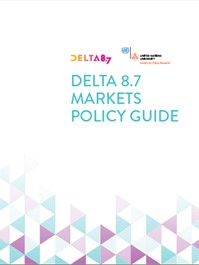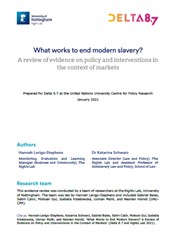What actually works to end modern slavery in the context of markets? In the past decade, we have witnessed a heightened awareness of the risk of modern slavery occurring within global supply chains, with a corresponding increase in regulation, funding, private sector engagement and programming to address it. The growth in multi-stakeholder collaboration is an indication of our shared commitment to end modern slavery in all its forms, and a sign of hope that it will be possible. What is needed now to achieve Target 8.7 of the United Nations Sustainable Development Goals (SDGs) through a markets lens is a common understanding of what programmatic interventions effectively reduce the number of people who are subjected to this crime, to guide policy and investment decisions.


